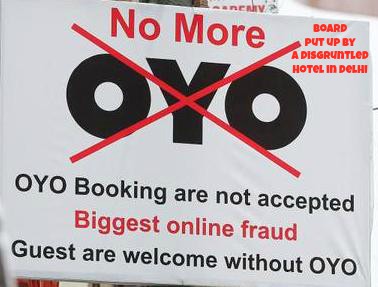

By Sunil Garodia
First publised on 2020-01-16 07:50:39
Oyo is facing double trouble. It was being bombarded by desertions from partner hotels in China and India for the last six to nine months on account of alleged unfair business practices. Now it is being pressurized into downsizing by investors. It has already terminated the services of more than 500 staff in China and over 1200 in India. Another 1200 are soon to be given the pink slip in India. Most companies trim 5% of their workforce every year for under-performance, but such large scale lay-offs are signs of trouble in the company.
Why is this happening? There are two big reasons for this. The first is that there has been a change in the global policy of Oyoâs biggest investor, the SoftBank. Rattled by huge losses in companies like Uber and WeWork in its portfolio, the startup investor has changed its global policy. It has started nudging companies to cut the 'fancy' stuff and show profits. Shedding part of the workforce and reassigning tasks to remaining workers is part of this strategy to turn the companies around.
The second reason is that despite, or maybe because of, growing phenomenally, the losses of Oyo have continued to climb. This has forced the company to allegedly impose several undue charges on partner hotels. The hotels allege that this was not part of the contract they signed with Oyo. Many of them have stopped taking bookings from the company and some of them have taken it to court. Oyo has already admitted that there has been a communication gap with its hotel partners and has promised to set it right. But, for now, it has entered turbulent skies.
This once again throws open the growth versus profits debate. Should startups chase growth without giving much thought to profits? Will profits follow if the company reaches certain levels? Who decides what level of growth is optimum? When should a company stop chasing growth and start consolidating? Should investors keep pumping in money even if profits are nowhere to be seen? There are no easy answers to these questions.
Customer acquisition and retention is an extremely costly process. Further, customer loyalty cannot be taken for granted in this age of fierce competition and mouth-watering offers and discounts. Hence, even if growth is important, a period of consolidation, of catching one's breath and setting the house in order, is equally important. If growth is important to keep ahead of the competition, profits are equally, or even more, important in order to keep running the company and make it attractive for investors. Just the expectation of profits can take one thus far and no further. Oyo must be realizing this the hard way.











